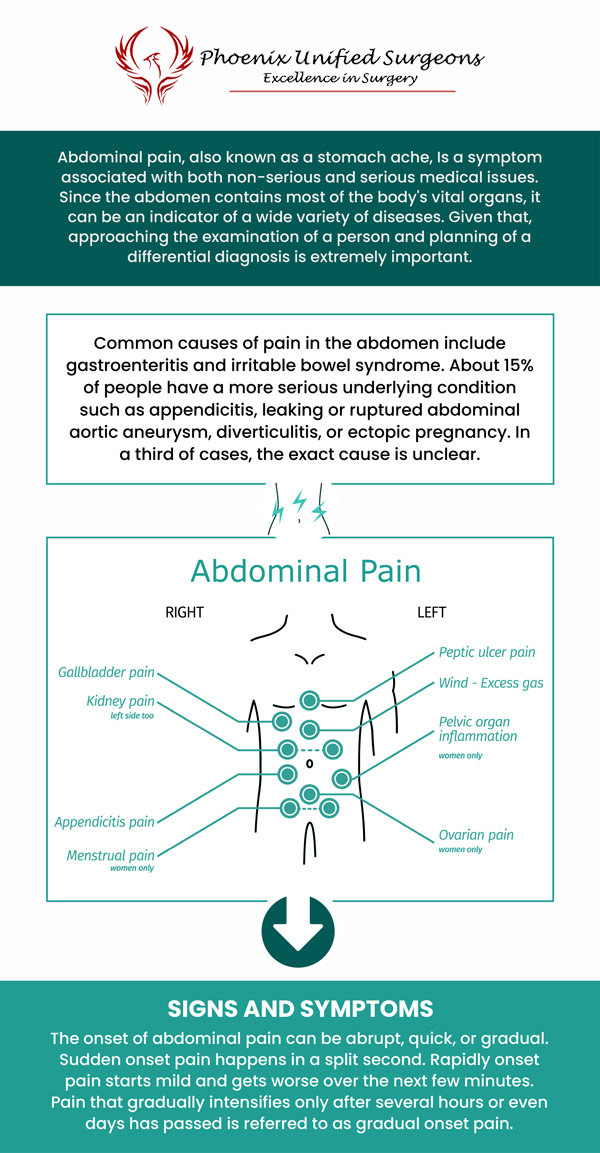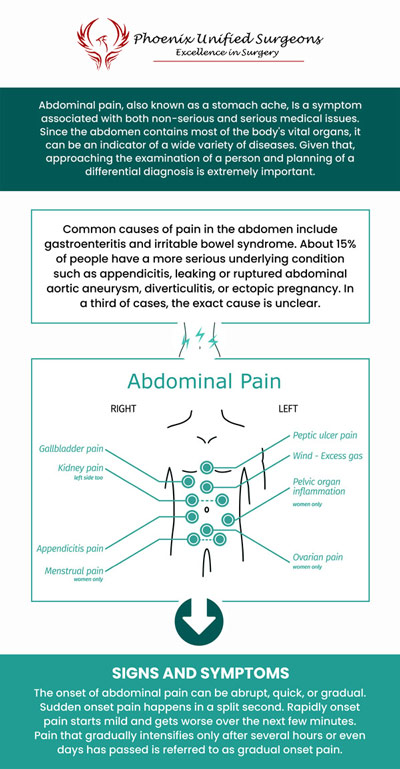Abdominal Surgery Specialist in Phoenix, AZ
Abdominal surgery refers to procedures performed on the organs inside the abdominal cavity, including the stomach, intestines, and liver. It may be necessary for various reasons, including treating infections, injuries, or chronic conditions. To ensure the success of the surgery and a smooth recovery, visit our board-certified surgeons at Phoenix Unified Surgeons. For more information, please contact us or book your appointment online. Our office is conveniently located at 20333 N 19th Avenue, Ste 230 Phoenix, AZ 85027.




Table of Contents:
What kind of doctor do you see for abdominal pain?
What conditions may require abdominal surgery?
What should I expect before, during, and after abdominal surgery?
How long is the recovery period after abdominal surgery?
Determining the right specialist to see often depends on the nature, severity, duration, and accompanying symptoms of your abdominal discomfort.
First Steps: Primary Care Evaluation
Initially, it’s advisable to consult your primary care physician or general practitioner. These doctors can provide initial assessments, evaluate your medical history, conduct physical exams, and order preliminary diagnostic tests, including blood work and imaging studies. If your primary care physician suspects a condition requiring specialized surgical evaluation, they will likely refer you to a surgical practice such as Phoenix Unified Surgeons.
When Surgery Might Be Needed
Certain abdominal conditions require surgical intervention. Our highly skilled surgeons specialize in diagnosing and treating conditions such as:
• Appendicitis
• Hernias
• Gallbladder disease (including gallstones and cholecystitis)
• Gastrointestinal obstructions
• Diverticulitis
• Colon and bowel conditions requiring surgical management
Our surgical team is experienced in both minimally invasive surgery (laparoscopy) and traditional surgical procedures, offering personalized treatment tailored to your condition.
Collaboration with Other Specialists
Abdominal pain may sometimes require collaboration with other specialists. If your symptoms suggest digestive conditions not requiring immediate surgery, such as ulcers or inflammatory bowel disease, our team can coordinate with gastroenterologists. For issues involving reproductive health or pregnancy, we partner closely with OB-GYN specialists.
At Phoenix Unified Surgeons, our expert surgical team specializes in comprehensive abdominal surgery, providing personalized care for a wide range of medical conditions affecting the digestive tract and associated organs. Our experienced surgeons routinely handle procedures for common abdominal issues such as appendicitis, an inflammation or infection of the appendix, where prompt surgical removal is crucial to prevent complications. We also expertly address hernias, repairing weakened abdominal walls to alleviate discomfort and prevent further complications.
Our practice specializes in treating gastrointestinal disorders, including gallbladder conditions such as gallstones or inflammation (cholecystitis), often requiring precise and minimally invasive surgical removal of the gallbladder. At Phoenix Unified Surgeons, we ensure patients struggling with inflammatory bowel diseases like Crohn’s disease or ulcerative colitis receive personalized surgical interventions when medication alone cannot adequately control symptoms or complications arise. Additionally, our surgeons are trained to manage bowel obstructions promptly, performing emergency procedures to relieve blockages and restore intestinal function.
Conditions affecting reproductive organs, including ovarian cysts or uterine fibroids, are also within our specialized expertise, allowing us to provide effective surgical solutions tailored specifically to women’s health.
With advanced surgical techniques, compassionate care, and a commitment to excellence, our team is dedicated to improving patient outcomes and enhancing quality of life for patients throughout our Phoenix community.
When preparing for abdominal surgery, it’s important to understand the steps involved and what you can expect before, during, and after your procedure. Our experienced surgical team is committed to guiding you every step of the way, providing individualized, compassionate care to ensure the best possible results and a smooth recovery.
Before Your Surgery
Prior to your procedure, our team will conduct a comprehensive preoperative evaluation. This typically includes a physical examination, blood tests, imaging studies, and potentially cardiac screening to confirm your readiness for surgery. You’ll discuss your complete medical history, current medications, allergies, and any previous surgeries you’ve had. Our surgeons will provide clear guidance on medications you may need to stop or adjust in the days leading up to surgery, and give you detailed fasting instructions, usually advising you to avoid food and drink after midnight the night before your scheduled procedure.
On the Day of Your Surgery
When you arrive at Phoenix Unified Surgeons, our friendly and professional medical staff will welcome you and guide you through the pre-surgical preparation. You will be provided with a comfortable gown, and an intravenous (IV) line will be placed to administer fluids and medications. Throughout the surgery, our highly skilled surgical team will closely monitor your vital signs, ensuring your safety and comfort. Maintaining a sterile, controlled environment is a priority for our surgeons, greatly reducing the risk of infection and complications. The length of your abdominal surgery depends on the complexity of your particular procedure and individual factors.
After Your Surgery
Following your procedure, you’ll be transferred to a recovery area, where our dedicated postoperative care team will closely monitor your vital signs and overall comfort as anesthesia wears off. It’s common to feel groggy, slightly nauseated, or disoriented initially. You may experience mild to moderate discomfort at the incision site, and our team will promptly provide appropriate pain management medications to keep you comfortable. Depending on your procedure, you might have temporary drains or catheters to aid in the healing process.
The recovery period after abdominal surgery varies depending on the type of surgery, your overall health, and any complications. For major surgeries, such as bowel resections or exploratory procedures, you can expect a hospital stay of several days to a week. Minimally invasive laparoscopic procedures, however, generally require a shorter hospital stay of 1-2 days.
In the first few days after surgery, you may experience discomfort, pain, swelling, fatigue, and limited mobility. Our surgical team at Phoenix Unified Surgeons provides personalized pain management and encourages early mobility to reduce risks of complications, such as blood clots or pneumonia. It’s important to start moving as soon as possible to aid healing and prevent these issues.
Most patients can resume light activities within 2-4 weeks, but strenuous activities like heavy lifting or intense exercise should be avoided for 6-8 weeks to ensure proper healing of abdominal tissues. Depending on the surgery, dietary changes may be necessary, especially after gastrointestinal procedures. We will guide you through transitioning from clear liquids to soft foods and back to a normal diet as you heal.
Full recovery, including wound healing and restored energy levels, typically takes 2-3 months, but individual recovery times can vary. For more information, please contact us or book your appointment online. Our office is conveniently located at 20333 N 19th Avenue, Ste 230 Phoenix, AZ 85027. We serve patients from Phoenix AZ, Sun City AZ, Peoria AZ, Surprise AZ, Glendale AZ, Scottsdale AZ, and surrounding areas.
Check Out Our 5 Star Reviews



Additional Services You May Need
▸ Colon & Rectal Surgery
▸ Gallbladder Surgery
▸ Colonoscopy
▸ Wound Care
▸ Hernia Repair
▸ General Surgery
▸ Robotic and Minimally Invasive Surgery
▸ Appendectomy
▸ Colon Repair/Resection
▸ Lipoma & Cyst Removal
▸ Endoscopy and Colonoscopy
▸ Abdominal Pain
▸ Colon surgery for Diverticulitis
▸ Colon surgery for Colon Cancer
▸ Hemorrhoids
▸ Anal Fistulas
▸ Anal Pain Surgeries
▸ Colostomy Avoidance Surgery
▸ Fecal Incontinence Surgery
▸ Crohn’s Surgery
▸ Ulcerative Colitis Surgery






